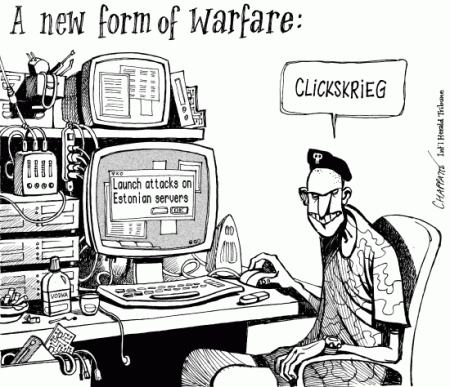
Fans of WikiLeaks have launched numerous, high-profile Denial-of-service attacks (DDoS) on sites that turned against WikiLeaks recently. Targets as varied as Sarah Palin, Mastercard, the Swedish government, and the Swiss bank Postfinance have come under attack for either criticizing WikiLeaks or for refusing some services to Julian Assange.
I don’t know the details of all the services that have been refused to Assange, but in the Swiss case, Postfinance closed down the Swiss bank account of Julian Assange because Assange had provided a fake postal address in Geneva. The bank simply followed normal procedures vis-a-vis account holders that provide false information. The client may have been high profile, but the procedure was normal.
In revenge for a variety of acts designed to curtail WikiLeaks’ space for maneuver by the above-mentioned institutions, a group, calling themselves „Anonymous,“ has been waving a kind of cyberbattle in the name of free speech and in support of WikiLeaks. These attacks by “Anonymous” are problematic for several reasons:
- These are the first relatively big ‘cybercitizen’ actions against official institutions, waged in an organized and sustained fashion. It will raise awareness of cyber-attacks and confirm, even justify, the increasingly stringent approach that many governments take in order to strengthen their control over cyberspace.
- It popularizes the concept of cyber-attacks by ‘guerilla forces’, spreading cyberweapons potentially to every citizen. This will greatly strengthen the trend for hacker groups that act in concert and often without any ethical grounds (which of course can be debated in this case). This promises to create and certainly at least greatly increase chaos in cyberspace as the specter of every unhappy, tech-savvy teenager attacking sites they don’t like rises.
- Contributing to a cyber-attack, for whatever reason, is illegal and the current wave of attacks suggests that the legal parameters of such action in cyberspace are not set. But they are, and many of these attackers (whatever their motivations were) will be faced with consequences in the ‘real’ world as soon as police catch up to the attackers and the legal consequences of their actions become clear. A 16-year old Dutch man was arrested yesterday on exactly these grounds.
- It threatens free speech, the exact thing that WikiLeaks is defending. By not allowing official institutions to express their views on Wikileaks, or to take legal action against Julian Assange, the hackers are in fact doing the exact opposite of what WikiLeaks is trying to do worldwide. I’m not saying that the cyber-attacks on WikiLeaks itself are not problematic, they most certainly are (as is the way Assange is being threatened, most shockingly with death, by some parties), I’m simply saying that those by WikiLeaks supporters are promoting the “with or against us” approach that ultimately stands in stark contrast to the very idea of free speech. One has to have the right to disagree or refuse to cooperate without being threatened or disabled.
Or as it was put this morning on Swiss radio: “The internet is like a Kalashnikov. You don’t put it in the hand of Cro-Magnon without a careful explanation of how it works.” And in the case of this wave of cyber-attacks surrounding Wikileaks, I just think that too many Cro-Magnon have way too many Kalashnikovs at hand.


2 replies on ““Cyberguerillas” on the March”
Actually, “Anonymous” can not be described as an organisation (as in the comment above) as it is merely a loose grouping of people without institutionalised hierarchy.
I share concern outlined in the first point of the blog post: the danger of governments seizing the chance to introduce laws in order to (try to) restrict internet content. On the other hand state influence has already worked reasonably “well” in the Wikileaks case; be it in the form of anticipatory obedience or as a consequence of actual intervention.
However, I do not quite agree with the fourth point from the post, that the attacks are a threat to free speech. The sites under attack were just taken down for a few hours, most probably because the capacity was not big enough to attack several sites at once. When the target was changed after a while the attacked sites were quickly up and running again. For me this is too harmless to threaten freedom of speech, as technical difficulties of hosting providers can lead to the same result from time to time.
Actually we are speaking about ‘distributed’ DoS (DDoS) attacks from multiple systems. With its ‘Low Orbit Ion Cannon (LOIC)’ the Organization ‘Anonymous’ provides a tool which is pretty easy-to-use by everybody. This is what makes it a new form of rioting. Therefore, I wouldn’t call it ‘high-profile’ DoS attacks which are directed attacks from single systems.